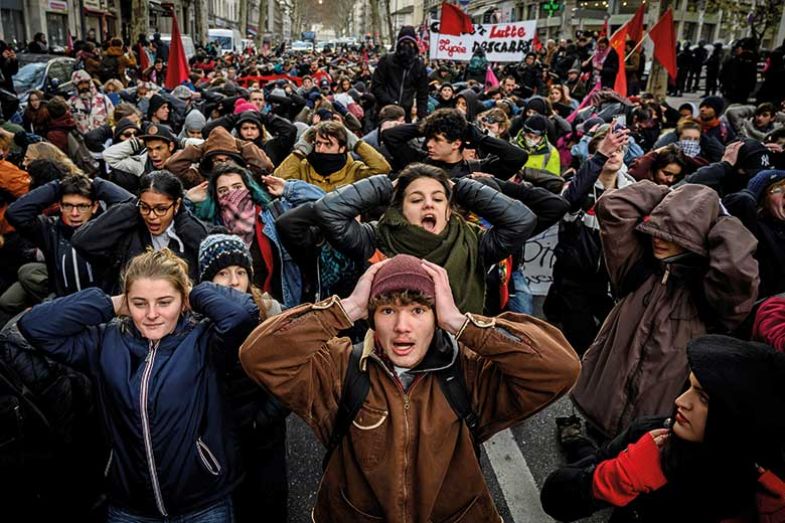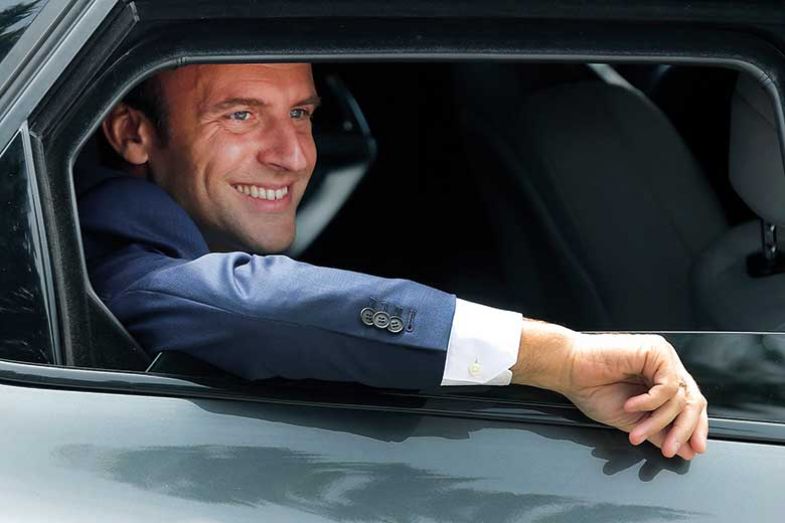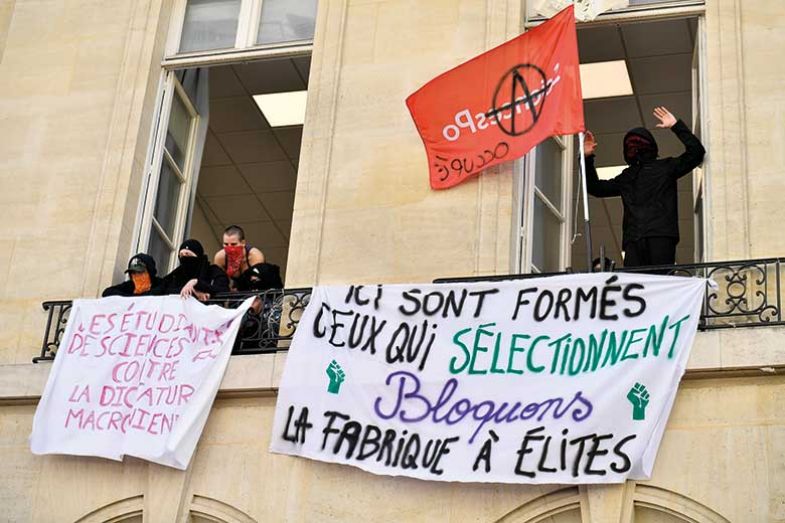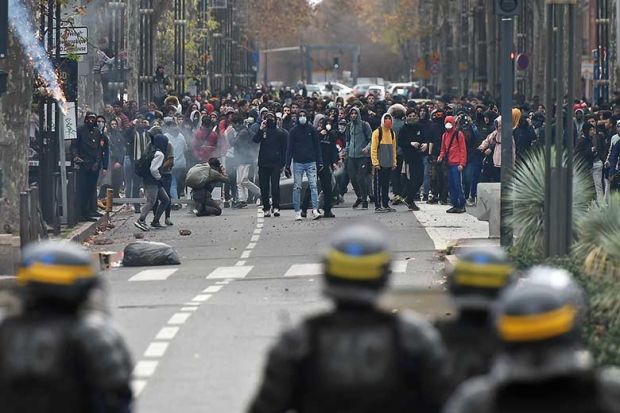In early December, as yellow jacket-wearing protesters turned the grander parts of central Paris into a wreckage of burned-out cars and smashed-up restaurants, demonstrations less noticed by the international media began to flare up in French high schools.
At one point, students barricaded close to 200 high schools shut. Around 1,000 pupils reportedly took to the streets in Toulouse. Some threw stones at the police, who fired tear gas. In another demonstration at a school to the west of Paris, police made 140 arrests, and forced many students to kneel on the ground, prisoner-of-war style, eliciting condemnation online.
The trigger for these school insurrections was some of the most significant educational reforms in France for decades. From the current academic year, French universities have been able to use applicants’ school grades to rank applicants for places.
This might sound utterly unremarkable to American or British ears, but the changes are a paradigm shift in a system that has always prided itself on egalitarianism, conferring a legal right to university entrance on everyone who passes the high school baccalaureate.
If something unites the high school students and the yellow jacket movement – which, after initially rallying around opposition to a diesel tax hike, morphed into a wider protest movement against high taxes and living costs, as well as the high-handed tone that president Emmanuel Macron has sometimes taken with the electorate – it is arguably an anxiety that the president’s vision of France is one that allows the already fortunate to get ahead, while leaving everyone else behind. The fear is that university selection will lead to more institutional stratification, and, ultimately, to even greater levels of social segregation.
Yet to supporters of the reforms, introduced through an admissions system called Parcoursup, the non-selective French university system has been for years mired in student failure, waste and hypocrisy that has particularly failed the children of working-class families.
For François Germinet, president of the University of Cergy-Pontoise, north-west of Paris, the attrition rate for students during the first year of university is a “human disaster”. And for Frederic Dardel, president of Paris Descartes University, it is “academic slaughter”. Speaking to Times Higher Education in his office at the heart of Paris’ historic university district (someone has stuck an anti-Parcoursup sticker demanding “no to selection” outside the entrance to his building), Dardel notes that under the previous admissions system, which took no account of high school subjects or grades, he knew that around 200 of the 1,400 medical students admitted to his institution each year would fail “before they even sit in the lecture room”. Some of those 200 would retake the year, only to fail again. This process, says Dardel, would “waste two years of their life”, and wreck their confidence.
Such arguments were central to the government’s case when it unveiled the Parcoursup reforms in November 2017. It put the country’s university dropout rate – which is contested and can be measured in several ways – at an astonishing 60 per cent. That overall figure, though, varies hugely according to the type of high school baccalaureate that students have taken. Just 11 per cent of students with the better established, most prestigious general baccalaureate (itself split into science, social science and humanities tracks) leave higher education without a degree, according to “Access to Higher Education: the French case” , a research paper that explores the French system. Yet 30 per cent of those holding a technological baccalaureate leave higher education empty handed. And for students with a “professional” baccalaureate, 61 per cent end up without a degree. It is youngsters from poorer backgrounds who tend to take the technological or professional routes.
Pulling out a laptop, Dardel points to figures showing that the success rate for those with a professional or technical baccalaureate at Paris Descartes was “almost zero” in 2016‑17, before Parcoursup was introduced. “It doesn’t mean that none of them can succeed,” he says. But because the previous system selected students solely on the basis of whether they lived close to the university and had identified it as one of their preferences, “it was creating a huge waste”.
Reforms that expanded access to the professional route in 2008 saw the number of students with a baccalaureate increase by about 10 per cent, explains Julien Grenet, a professor at the Paris School of Economics and an expert on university admission systems. “[The baccalaureate] is a passport to higher education, and these students did not have access before. The problem is that the higher education system has not adapted to their needs,” he says.
This view is echoed by Marie-Céline Daniel, vice-president for education at Sorbonne University. “The requisites of the baccalaureate have changed, but our demands at universities haven’t,” she says. “So there is a gap that has been widening” between the end of high school and the first year of university.
For some large literary subjects at the Sorbonne – one of France’s most historic universities – and elsewhere, the first-year failure rate could hit 50 per cent, she explains. Professional baccalaureate students in particular arrive without the required level of writing and argumentation skills, she says. Another problem is that the old system did a poor job of matching students with their preferred courses. Daniel recalls meeting students for whom the Sorbonne English department was their 18th choice: “Why am I here?” they wondered.

Non!: French high-school students led vociferous protests against reforms to university admissions that bring in a more selective entry process
Adding to the pressures on the system, a baby boom at the beginning of the millennium is now beginning to filter through to university; Dardel estimates that it means the system has had to cope with the equivalent of two or three extra universities’ worth of students. Under these strains, some courses have become increasingly oversubscribed, to the annoyance of high-flying applicants, who resented that places were being taken by the less academically able. “I had letters from their parents,” Dardel recalls. “More and more students were getting frustrated by the system.”
Courses were particularly oversubscribed in Paris. “You get lots of kids of journalists, politicians, people with influence, who were not getting admitted in the track they wanted,” says Dardel. “And these [types of people] are more outspoken”.
Adding to the sense of injustice was the revelation in 2016, after a long legal battle for transparency, that a lottery was being used to break ties between applicants. In reality, few actually lost out because of the lottery system: by Grenet’s calculations, only 3 per cent of students who applied to oversubscribed courses failed to get their first choice owing to bad luck in the draw. Still the “unjust” and “dehumanising” lottery system was seized upon by the government when it unveiled the Parcoursup reforms last year.
And although the system is only a few months old, there is cautious optimism that the reforms seem to be working. At least on some courses, there is a fuzzy sense that students are turning up better prepared and less likely to drop out.
“Our impression is that…students are more pleased about where they are than [they were] last year,” says Cergy-Pontoise’s Germinet. And at Paris Sud University, early test results show significant signs of improvement – although whether the system has simply redistributed weaker students to less prestigious universities outside Paris will only become clearer when full statistics are published at the end of this academic year.
The reforms also allow universities to attach strings to their offers. They can require students to do a remedial preparation course, for instance, if they think they will struggle on a full-blown degree, or shift them on to a more appropriate, vocational track. But French universities have had to race to develop these alternatives in time for this academic year.
Paris Descartes runs a “zero year” preparatory course for students who may not otherwise cope. At the Sorbonne, too, 40 students have been enrolled on a special preparatory course to help them pass the first year, explains Daniel. Yet these programmes are “extremely costly” to run, and even though the government has made extra money available, “you can’t get the community of academics to work on new programmes in a matter of three months. It just doesn’t work like this,” Daniel says. Indeed, Germinet has told the government that Cergy-Pontoise needs at least three to four years to properly develop these alternatives.
Moreover, while universities accept that helping struggling students get up to speed is part of their role, Daniel insists that there are limits. “If there’s a literacy problem, the student will require remedial courses before starting university,” she says.

In the wooded Parisian suburb of Saclay, the reforms are ushering in an even more dramatic change: in effect, a two-speed system for students at the same university.
The University of Paris-Saclay is the name given to a constellation of research institutes, universities and technology institutions recently brought together to create a critical research mass, and a “global brand” that can draw in students from across the world. The Parcoursup reforms have made it much easier for Saclay to create a highly selective bachelor’s track, with a mission to attract the best “national and international students”, explains Isabelle Demachy, vice president of Paris Sud, which is part of the Saclay alliance. In November last year, the French government announced plans to raise fees for international students – to €2,770 at bachelor’s level and €3,770 at master’s level, as part of a wider effort to attract hundreds of thousands more to the country.
At the same time, the university still has a “public mission” to educate students from the surrounding region, and so is also creating an “undergraduate school” to experiment with new ways of helping struggling students, Demachy says. This dual system of degrees on the same campus – one selective, one less so – is “a new concept in French universities”, she says.
It would be wrong to imagine that French universities are now free to recruit the best students from across the country unhindered. They are still bound by course-specific limits on how many students they can admit from outside their regions; at Paris Sud, for instance, just one in 20 students comes from outside the local area. However, Parcoursup still allows more inter-regional movement than its predecessor did, says Grenet. Under the old system, students from just outside Paris were prevented from attending universities in the capital, creating a “real sense of spatial discrimination, and social discrimination”, he says.
Some Parisian universities are now pushing for the regional quotas to be relaxed further, which would give them more freedom to recruit who they want. Yet the fear is that smaller, provincial universities could lose out if further liberalisation allowed the capital to hoover up the best students from their regions.
Greater control over admissions would also inevitably come with greater levels of scrutiny, as universities outside France know all too well. Harvard University, for instance, is currently bogged down in a legal challenge over its admissions processes regarding Asian Americans and the children of big donors and alumni, while the universities of Oxford and Cambridge are constantly criticised in the UK for their low level of admission of students from state schools. According to Daniel, there is a “general caution” at the education ministry about revealing too much regarding how applicants are selected, for fear it will lead to an “endless” hunger for answers from students and parents about who got in and why.
Then there are the ideological qualms. At Paris Descartes, the Faculty of Social Science even refused to rank applicants, citing political objections to the reforms, explains Dardel; he and colleagues had to do the job themselves over a weekend. “Some of the professors didn’t want to do it,” he says. “They don’t want the burden of choice to lie on them.”
One irony is that just as France has scrapped admissions lotteries, some in the UK and US are beginning to wonder whether they might be a good idea – albeit in a much more limited form than the pre-Parcoursup system. In a book published last year, Lee Elliot Major, chief executive of the UK social mobility thinktank the Sutton Trust, and Stephen Machin, professor of economics at the London School of Economics, argue that places at oversubscribed universities should be distributed randomly to students with grades above a certain threshold. The hyper-selectivity of “elite” universities favours the middle classes, who are better placed to help their offspring navigate the “baffling” selection processes, the book, Social Mobility and Its Enemies, argues. A lottery could therefore level the playing field.
Meanwhile, in the US, Natasha Warikoo, an associate professor of education at Harvard, has floated the idea of a lottery system to decide between applicants to her university who surpass a certain threshold. The idea is that this would overcome some of the alleged arbitrariness in the process – assessment of applicants’ personalities, for example – that has led to accusations of discrimination against Asian Americans.

Occupé: students blockade the law faculty at Sciences Po in protest at Macron’s selection reforms and university elitism
Such is the political and social importance now of who goes to university, and where, that the world’s foremost thinker on inequality, the French economist Thomas Piketty, decided to weigh into the debate on Parcoursup when it was being mooted by the government. The changes carried the “obvious risk of a drift towards inequality and...academic hyper-stratification,” he wrote in his Le Monde blog. Yet even Piketty prefers a Parcoursup-type system to the lottery it replaced, as long as it sufficiently takes into account applicants’ family backgrounds as well as their grades, he tells Times Higher Education. The problem is that, as things stand, there is “far too little” emphasis on parental status, he warns.
It is “absolutely a major concern” that a selective system will funnel students with a lower socio-economic status into second-class courses, says the Paris School of Economics’ Grenet. “Selection in universities introduces stratification” in terms of level of academic achievement. Therefore, almost inevitably, it creates “segregation by social background”, he says.
Parcoursup has deployed some measures to prevent this. It bumps applicants up and down the ranking to ensure that the same proportion of students from a low socio-economic status get offers as apply. Moreover, among those who spoke to THE, there is very little sense that the reforms will significantly deepen inequality in French society, for the simple reason that higher education outside universities, which accounts for about half of all students, is already selective – and, in some cases, extremely elitist.
Around 13 per cent of students with a general baccalaureate enter preparatory classes for France’s grandes écoles, according to Access to Higher Education (almost no students with a professional baccalaureate get in). These prestigious institutions have total freedom to select their students, and they furnish France with much of its elite – including Macron himself, who attended not one but two grandes écoles. Indeed, the dominance of grandes écoles graduates in politics and business is a well-worn complaint in France, and has been blamed for fuelling the kind of anti-establishment resentment that animates the yellow jackets protesters. One 2013 book, France’s Got Talent: The Woeful Consequences of French Elitism, found that around 60 per cent of presidential staff hailed from just two grandes écoles.
This hypocrisy about equality is “very French”, thinks Grenet. “On paper, we level the playing field” in universities, but “on the side, develop a whole different system” to restore the incline.
Critics, including Piketty, point out that these selective tracks are handsomely funded in comparison with universities. The state spends 40 per cent more per student on grand école preparation classes than on university classes, according to Access to Higher Education.
In addition to the grandes écoles, France also offers more moderately selective two- or three-year vocational programmes, taught in high schools in relatively small classes and specialising in areas such as tourism and management. Youngsters with a professional baccalaureate tend to do much better here than in university, but, increasingly, they are being squeezed out by the children of wealthier, higher-status parents, who see a selective vocational course as a better bet than university.
“It’s a disaster that these [professional baccalaureate] students...end up being forced into university, where they have no chance of succeeding,” Grenet thinks.
The consensus among those who spoke to THE is that the government needs to do more to increase capacity on these selective vocational courses. Yet it remains far cheaper to expand existing university programmes, where a lecturer can teach hundreds of students at once. (The Ministry for Higher Education Research and Innovation did not respond to THE’s questions about the reforms.)
On the streets of Paris, life had begun to return to normal by the time of THE’s visit in mid-December, as the yellow jackets’ protests petered out in the wake of Macron’s promise of a series of mollifying measures, including a minimum wage rise and a delay to a rise in fuel taxes. But while he stayed silent on Parcoursup, questions must remain over its future when the Macron project is in such deep trouble. The president’s popularity rating keeps hitting new lows; one poll in mid-December put it at −53 per cent.
Jean-Luc Mélenchon, the left-wing firebrand who came close to beating Macron in the first round of the 2017 presidential election, has been scathing about the reforms, arguing that they will reinforce social inequalities. It is possible that the pendulum will swing away from Macron’s Anglo-American-style efficiency and back towards égalité à la française after the next presidential election in 2022.




